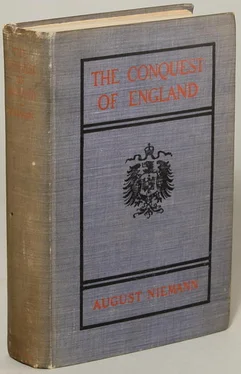His bungalow was in the centre of the camp, which lay in the middle of a broad grassy plain. It consisted of a group of buildings which surrounded a quadrangular courtyard, adorned with exotics and a splashing fountain.
As it appeared, he had given orders that Heideck was to be admitted immediately on arrival; for the adjutant, to whom he had announced himself, conducted him at once into the study of his superior officer.
Quite politely, though with a frigidity that contrasted with his former behaviour towards the popular guest of the officers’ mess, the fine man, with his martial carriage, thanked him for his prompt visit.
“Please be seated, Mr. Heideck,” he began. “I have been very unwilling to disturb you, but I could not spare you this trouble. I have received the intelligence that you were received by the Maharajah this morning.”
“It is true. I had to talk to him about some business; I am on the point of purchasing from him a large consignment of indigo for my Hamburg firm.”
“I have, of course, nothing to do with your business; but I must inform you that we do not approve of direct communication between Europeans and the native princes. You will, therefore, for the future, be best advised to communicate with me when you are summoned to the Maharajah, so that we may arrive at an understanding as to what you may, or may not, say to him. We cannot, unfortunately, trust all the Indian princes, and this one here is, perhaps, the most unreliable of them all. You must not, however, regard what I say to you as an expression of any want of confidence in yourself. The responsibility of my position imposes upon me, as you see, the greatest possible prudence.”
“I understand that completely, Colonel!”
“At this very moment the situation appears to be more than ever complicated. I shall be very much surprised, if we are not on the eve of very disquieting times. The Governor-General of Turkestan is marching this way, and his advance guard has already passed the Afghan frontier.”
Heideck had difficulty in concealing the excitement, which this confirmation of Tchajawadse’s story aroused in him.
“Is that certain, Colonel? What do the Russians want in Afghanistan?”
“What do the Russians want there? Now, my dear Mr. Heideck, I think that is plain enough. Their advance means war with us. Russia will, of course, not openly allow this at present. They treat their advance as a matter which only concerns the Emir and with which we have nothing to do. But one must be very simple not to discern their real intentions.”
“And may I ask, Colonel, what you are thinking of doing?”
Colonel Baird must really have held the young German for a very trustworthy or, at least, for a very harmless personage, for he replied to his question at once—
“The Russian advance guard has crossed the Amu Darya and is marching up the Murghab Valley upon Herat. We shall take our measures accordingly. The Muscovites will have been deceived in us. We are not, after all, so patient and long-suffering as to let our dear neighbours slip in by the open door. I think the Russian generals will pull long faces when they suddenly find themselves confronted in Afghanistan by our battalions, by our Sikhs and Gourkas.”
The adjutant made his appearance with what was evidently an important message, and as Heideck perceived that the Colonel wished to speak privately to his orderly officer, he considered that politeness required him to retire.
The words of the Colonel, “The Russian advance into Afghanistan means war,” rung unceasingly in his ears. He thanked his good fortune for having brought him at the right moment to the theatre of the great events in the world’s history, and all his thoughts were now solely directed as to the “where and how” of his being able, on the outbreak of hostilities, to be present both as spectator and observer.
That his Russian friend was animated by the same desire he could all the easier surmise, owing to the fact that Prince Tchajawadse belonged, of course, to one of the nations immediately concerned. He hastened, therefore, to acquaint him with the results of his interview with Colonel Baird. The effect of his communications upon the Prince was quite as he had anticipated.
“So, really! The advance guard is already across the Amu Darya. War will, then, break out just in the proper quarter,” exclaimed the Russian in a loud outburst of joy. “In our army the fear prevailed that the Tsar would never brace himself up to the decision to make war. Powerful and irresistible influences must have been at work to have finally conquered his love of peace.”
“You will, of course, get to the army as soon as possible?” inquired Heideck; and as the Prince answered in the affirmative, he continued: “I should be grateful to you if you would allow me to join you. But how shall we get across the frontier? It is to be hoped that we shall be allowed to pass quietly as unsuspected merchants.”
“That is not quite so certain; we shall probably not be able to leave India quite as readily as we entered it; but, at any rate, we must try our best. We can reach Peshawar by rail in twelve hours and Quetta in fifteen. Both these lines of railway are not likely at present to be blocked by military trains, but we shall do well to hasten our departure. In all probability we shall, either by way of Peshawar or Quetta, soon meet with Russian troops, for I have no doubt that a Russian army corps is also on the march upon Cabul, although the Colonel, as you say, only spoke of an advance guard moving on Herat.”
“I would suggest that we go by way of Peshawar and the Khyber Pass, because we should thus reach Cabul most speedily and with the greater security.”
“We will talk more of this anon, comrade! At all events, it is settled that we travel together. I hope most fervently that in the great theatre of the world your nation is at this present moment standing shoulder to shoulder with mine against England.”
As a married man, Captain Irwin was not quartered in one of the wooden barracks of the English camp, but had his own bungalow in the suburbs.
It was a house of one story with a broad verandah, was surrounded by a large well-kept garden, and formerly served a high official of the Maharajah as a residence. Apart from it lay two smaller buildings used as servants’ quarters, of which, however, only one was at present in use.
The sun of that same day, that had brought Hermann Heideck face to face with such momentous matters affecting his future for his final decision, was sinking rapidly into the heavens as he passed through the cactus hedge and bamboo thicket of the garden surrounding Irwin’s bungalow.
He was attired in an evening dress of the lightest black cloth, such as is prescribed by English custom for a visit paid at the dinner-hour in those climes.
He did not come that evening of his own initiative, for Irwin’s morning salutation did not promise anything in the way of an invitation. A letter from Mrs. Irwin had, to his surprise, begged his company at this hour. He had gathered from the tone of the letter that something especially urgent required his presence, and he was not slow in supposing that the reason was the unfortunate party at poker in which the Captain had taken part.
What, however, could have induced Mrs. Irwin to appeal to him was still an enigma, for his relations to the beautiful young wife had until then not been of a confidential nature. He had met her on several occasions in big society functions, at the officers’ polo-parties, and at similar gatherings, and if, attracted by her grace and intellect, he had perhaps paid more attention to the Captain’s wife than to any of the other ladies of the party, their relations had been strictly confined within conventional limits, and it would never have occurred to him to imagine himself specially favoured by Mrs. Irwin.
Читать дальше












